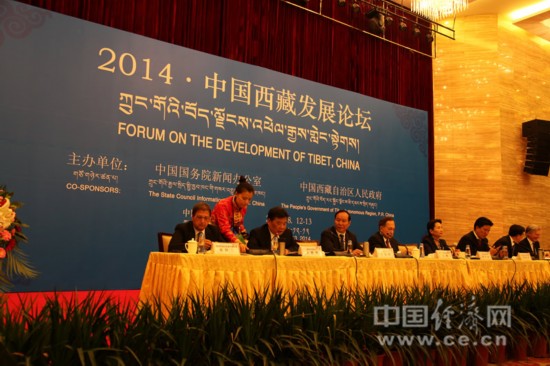China opens Tibet forum with focus on development
 0 Comment(s)
0 Comment(s) Print
Print E-mail Xinhua, August 12, 2014
E-mail Xinhua, August 12, 2014
Around 100 representatives from around the world convened for the two-day forum on the development of Tibet on Tuesday.
 |
|
China opens Tibet forum with focus on development |
The forum, hosted in the autonomous region's capital, Lhasa, will see delegates from Britain, India, the United states and other countries pool collective experience to discuss development strategies for the region.
Jointly sponsored by the Information Office of China's State Council and the regional government of Tibet, the forum seeks to gather opportunities and suggestions for Tibet's future. The protection of Tibetan culture and environment will also be highlighted.
Tibet was largely isolated from the modern world until the founding of the People's Republic of China in 1949. Since then the region has focused on development that meets the universal needs of human society and takes root in Chinese reality, wrote Yu Zhengsheng, chairman of the National Committee of the Chinese People's Political Consultative Conference (CPPCC), in a letter to congratulate the opening of the forum.
A New Tibet, combining its traditions with modern development, has emerged thanks to the efforts of the Tibetan people, the support from the central government and the rest of the country, as well as its opening up to the rest of the world, Yu wrote.
For years Tibet has been trying to find a development pattern that can strike a balance between the needs of its people and protection of its natural environment, Yu wrote.
"With its unique geographic location, natural environment and cultural tradition, Tibet has to follow a sustainable development pattern."
Yu welcomed all participants of the forum to lend their wisdom and come out with creative ideas about Tibet's development.
Leap-frog development is the basis for solving all problems Tibet is facing and the region's sustainable development is at the core, Losang Jamcan, chairman of the Tibetan regional government, said during the opening ceremony.
"Tibet will never develop at the expense of its environment," he said. "To protect Tibet's environment is the biggest contribution we can make to the nation and even humankind."
The chairman also vowed to maintain social stability and harmony, which he believes is a pre-condition for Tibet's leap-frog development.
Cui Yuying, vice head of the Information Office of China's State Council, said there are many voices in the international community regarding Tibet's development.
According to Cui, some insist Tibet should remain primitive and any development of the region equals the annihilation of Tibetan culture and the region's environment.
"To their understanding, Tibetans should always ride yaks and live in tents," she said.
Over the past half century, Tibet has been on an irreversible path of development and civilization, which complies with the general trend of the development of the human society, Cui said.
Representatives, including scholars, journalists, politicians and entrepreneurs, voiced their understanding of Tibet' s development.
The rapid and sustainable development of Tibet within the socialist system, in a way that benefits the region's 3 million people, is one of China' s strategic objectives, Narasimhan Ram, chairman of India' s Kasturi & Sons Limited, publisher of the country's largest English newspaper The Hindu, said during the opening ceremony.
"Tibet has been visibly transformed by double-digit GDP growth over two decades without a break and has entered a new stage of development," he said.
He believed the defining factors behind Tibet' s overall development include massive financial and resource support provided by the Chinese government, its preferential policies for Tibet, rapid infrastructure development and the building of a comprehensive modern transportation system.
"As a result of this development, Tibet's interaction and integration with the rest of China has deepened and its isolation from the rest of the world has decisively been ended," Ram told the forum.
Neil Davison, Labor's shadow Advocate General sitting in the House of Lords of the British Parliament, said few people in his country really understand the type of development taking place in Tibet.
He said through forums like the ongoing one and the power of media, people's understanding of Tibet can be developed.
After the forum, the representatives will conduct field trips in Lhasa and Nyingchi Prefecture.






Go to Forum >>0 Comment(s)